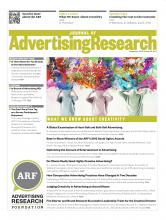Click on the PDF link for the complete article.
ABSTRACT
Prior research has revealed that advertisements utilizing a global consumer culture positioning (GCCP) strategy more often adopt soft-sell (indirect and image-based) rather than hard-sell (direct and information-based) appeals. However, little empirical research has examined consumer preferences for soft-sell versus hard-sell advertising appeals in multi-country settings. This investigation attempted to fill this gap by proposing a multi-country research framework and conducting a pilot study. Soft-sell and hard-sell versions of a print advertisement were pretested with nearly 2,000 subjects in both holistic- and analytical-thinking countries. Findings indicated that employing a soft-sell appeal would be more effective than its hard-sell counterpart in global markets. Results from t-tests collectively indicated that soft-sell advertisements were more likely to generate favorable attitudes and less likely to evoke advertising irritation in most of the countries examined. In closing, the authors discuss theoretical as well as managerial implications, recognize important limitations, and summarize suggestions for future research.
- © Copyright 2013 The ARF. All rights reserved.
ARF MEMBERS
If you are a member of the Advertising Research Foundation, you can access the content by logging in here
Log In
Pay Per Article - You may access this article (from the computer you are currently using) for 30 days for US$20.00
Regain Access - You can regain access to a recent Pay per Article purchase if your access period has not yet expired.







